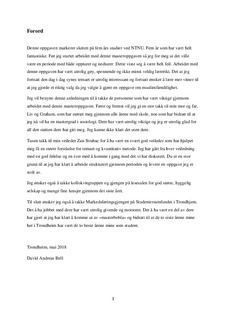Muslimfiendtlighet - En komparativ case-studie av muslimfiendtlighet i Norge, Frankrike, Polen og Tsjekkia
Master thesis
Permanent lenke
http://hdl.handle.net/11250/2571358Utgivelsesdato
2018Metadata
Vis full innførselSamlinger
Sammendrag
The theme of this thesis is anti-Muslim prejudice, and my focus is on the difference in anti-Muslim prejudice that can be found in Western Europe and Eastern Europe. To be more specific, I investigate what the different causal factors for prejudice are in four different cases. Two Western European nations, which are Norway and France, and two Eastern European nations, which are Poland and the Czech Republic.
I apply Blumer’s group position theory to get a better understanding of how ethnic prejudice occurs, and intergroup contact theory to further enhance the understanding of how contact can help reduce prejudice. These two theories represent different aspects of prejudice, where the former focuses on the development of prejudice, while the latter focuses more on how prejudice can diminish. I also apply the concept of securitization to explain how Muslims and Islam can be perceived as an existential security threat.
I use a comparative case-study to analyze the differences in anti-Muslim prejudice. This gives me the opportunity to get an enhanced understanding of the phenomenon by using the different cultural and historical aspects along with sociological theory to get a better understanding of the different mechanisms that lead to prejudice in the four selected countries. The data is collected from European Social Survey round 7 from 2014. I use logistical regression to analyze the differences in the anti-Muslim prejudice we find in the different countries.
My research shows that contact with a minority seems to play a very important role in reducing prejudice. The contact does not necessarily have to be with Muslims, as contact with any minority will reduce prejudice against Muslims. There are however differences in the effect of contact between the countries. Contact in France seem to be very important to the understanding of anti-Muslim prejudice, while contact in Norway does not seem to have an effect. Muslims also appear to be perceived as a cultural threat, rather than a security threat, the exception here is with the Czech Republic where I argue Muslims are perceived as a security threat. Religiousness appears to have an effect on how Muslims are perceived in Poland and the Czech Republic, although I argue that it is not the religion in itself that determines how Muslims are perceived, it is instead what the religion represents in the different countries. Finally, I have a discussion about how the theoretical framework for this thesis is better for explaining the anti-Muslim prejudice in Western Europe, rather than in Eastern Europe.
